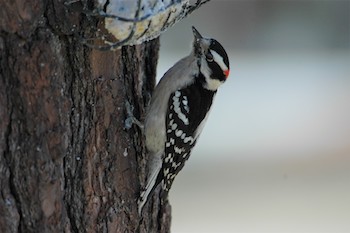Seeds for the Birds

Bird Feeding Basics
Over 100 bird species in North America will supplement their diets with bird seed, suet, fruit and nectar feeders. While feeding birds, a few steps can be taken to ensure you "do no harm" to the birds.
An official website of the State of Georgia.

Over 100 bird species in North America will supplement their diets with bird seed, suet, fruit and nectar feeders. While feeding birds, a few steps can be taken to ensure you "do no harm" to the birds.
Georgia is home to 11 hummingbird species during the year: the ruby-throated, black-chinned, rufous, calliope, magnificent, Allen's, Anna's, broad-billed, green violet-ear, green-breasted mango and broad-tailed hummingbird.
The ruby-throated hummingbird is the only species of hummingbird known to nest to Georgia. These birds weigh as little as a first-class letter. The female builds the walnut-sized nest without any help from her mate, a process can take up to 12 days. The female then lays two eggs, each about the size of a black-eyed pea.
By Terry W. Johnson
Each spring, a parade of flowering plants marches across the Georgia countryside. As I write this column, when I pause and look out across my yard, I am regaled with the beauty of the blossoms adorning Chickasaw plums, redbuds, yellow Jessamine, daffodils, jonquils, forsythias and pear trees. Around this neck of the woods, they are always at the head of Mother Nature’s spring parade of flowers.
Frogs, toads and some salamanders can be easily attracted to backyards by creating or improving aquatic habitats, provided these aquatic habitats have some forested areas nearby.
Ponds made by digging shallow holes and lining them with waterproof plastic are the easiest way to provide amphibians with the aquatic habitats they need for breeding and staying moist.